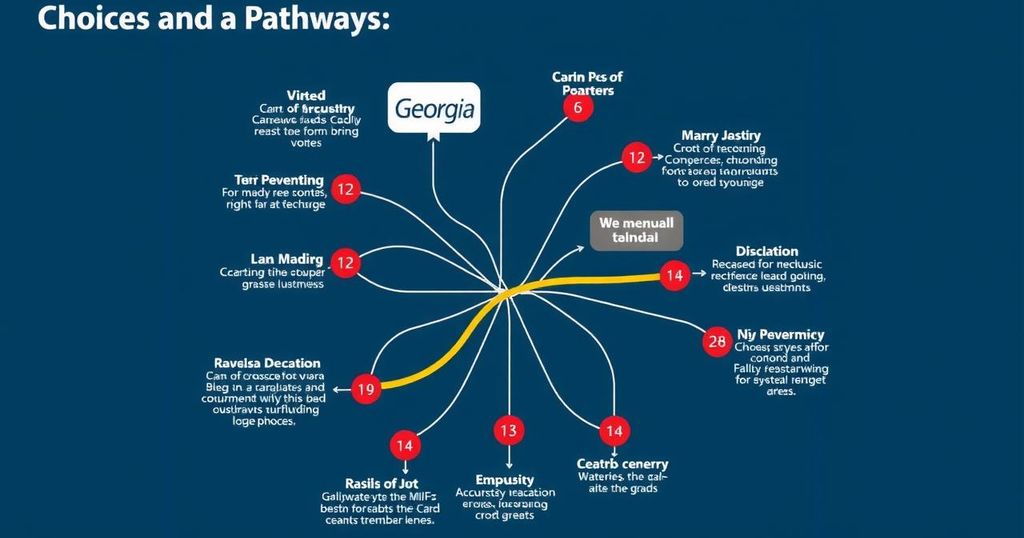Georgia’s Election: Choosing Between Russia and Europe

The Georgian parliamentary elections on Saturday are critical in determining the country’s future orientation, with potential implications for its alignment with either Russia or the West. The ruling Georgian Dream party’s shift towards pro-Russian policies contrasts sharply with public support for EU and NATO membership, highlighting a significant electoral divide. The polarized environment raises concerns over electoral integrity and could lead to coalition governance, affecting Georgia’s path forward in a tug-of-war between East and West.
Georgia is entering a critical juncture this weekend as parliamentary elections are set to dictate the nation’s alignment, either towards Russia or the West. The elections are closely scrutinized to assess whether the ruling party, the Georgian Dream, which has shifted from a pro-Western stance to embracing pro-Russia sentiments in recent years, can maintain power or if it will be replaced by pro-European opposition parties. Polls leading up to the elections are regarded as unreliable due to biases from pro-government or pro-opposition affiliations in their commissioning. Furthermore, it is plausible that no single party will achieve a parliamentary majority, resulting in a necessary coalition to govern. Observers of Georgian politics unequivocally agree that this election is a decisive moment for the nation, which has long grappled with its identity between East and West. Ketevan Chachava, a non-resident fellow at the Center for European Policy Analysis, articulated that the election is of paramount importance, noting that the rhetoric from the current governing party has alarmed pro-European factions and international observers. This sentiment reflects the broader struggles facing the country amid rising political polarization as the Georgian Dream administration has enacted policies that diverge from previous ambitions to join NATO and the European Union. Critics have decried these policies as repressive, particularly those undermining media freedoms and civil rights. The controversial introduction of legislation mirroring Russian foreign influence laws sparked significant protests earlier this year, marking a decline in Georgia’s adherence to European democratic ideals. Still, the government asserts its interest in EU accession while simultaneously employing anti-Western rhetoric, further confusing the electorate on its true intentions. Despite polls indicating that a vast majority of Georgians support EU membership, there remains a substantial divide between public opinion and governmental policies, heightening the stakes of the upcoming elections. As Georgia faces criticism from Washington and the EU for backtracking on democratic values, the urgency for a transformative electoral result grows. The electoral environment appears deeply polarized, with the potential for increased tensions surrounding the results. The new proportional electoral system complicates this landscape, making it challenging for either the Georgian Dream or opposition parties to dominate outright. The potential for coalition governance rises, yet there are significant concerns about electoral integrity, including allegations of malfeasance such as vote buying and ballot manipulation. Ultimately, the elections could serve as a profound referendum on Georgia’s future direction—signifying either a continued shift towards alignment with Russia or a decisive pivot back towards European integration. The implications are decisive, not only for internal politics within Georgia but also for the broader geopolitical dynamics of the Caucasus region.
The parliamentary elections in Georgia take place against a backdrop of intense political division concerning the nation’s trajectory—whether to embrace Western alliances or resort to ties with Russia. In recent years, the ruling Georgian Dream party has shifted its position from a pro-Western orientation to one increasingly sympathetic to Russian interests, leading to widespread fears of democratic backsliding. The sociopolitical landscape is thus marked by deep divides, with public support for EU and NATO membership contrasting sharply with the government’s policies and rhetoric, which increasingly veer away from European aspirations. This has led to heightened tensions both domestically and internationally, as the stakes surrounding these elections take on profound significance for Georgia’s future.
In summary, the upcoming elections in Georgia represent a critical juncture that will determine the nation’s geopolitical alignment. The ruling Georgian Dream party appears to be veering towards Russia, raising concerns among its citizens who largely favor integration with the West. The polarized political landscape, compounded by issues of electoral integrity and potential for coalition governments, underscores the complexities at play. The election outcome will not only shape Georgia’s domestic policies but will also have significant implications for its relations with both Russia and the West, making this a pivotal moment in the nation’s history.
Original Source: www.cnbc.com








